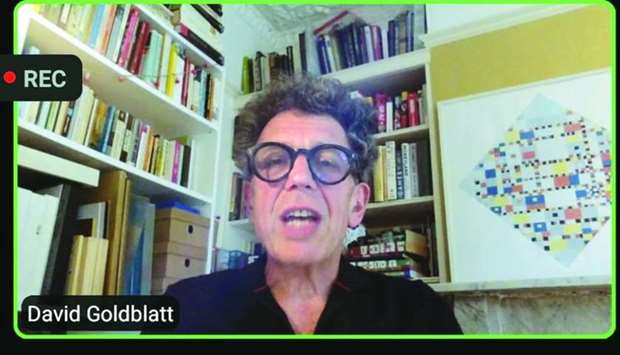Qatar is likely to set standards for future World Cup editions by hosting the FIFA World Cup Qatar 2022 with several unique features and initiatives, a leading football author noted Tuesday.
“Qatar has set very high standards for environmental protection. I think the 2022 World Cup is going to set the standards for future World Cups. The ambition and commitment of Qatar towards environment is very strong and very unique in global sports,” said David
Goldblatt, bestselling British author, journalist and sociologist.
Goldblatt was speaking at the World Cup 2022 Lecture Series launched by Georgetown University in Qatar (GU-Q). The online event, ‘The 2022 World Cup in Qatar in Historical Perspective’, was moderated by Dr Danyel Reiche, a visiting professor at GU-Q.
“The 2006 World Cup in Germany was the first one to have a proper dimension for the environmental aspects of the major sporting event. The 2014 and 2018 World Cup editions had full-scale carbon analysis. 2022 is genuinely different. The commitment of the Qatar
government towards environment is really noteworthy for a carbon-zero event. The seriousness towards to this commitment is seen in the construction as well as the public transport arrangements for the World Cup,” explained Goldblatt.
Speaking on the other aspects of the upcoming World Cup, Goldblatt said this is going to be the first World Cup in the winter in its entire history. He also said the 2022 World Cup has the potential to be termed the 'Middle East World Cup'.
“It builds on the experience of the 2010 World Cup in South Africa, which was termed as 'Africa’s World Cup'. Qatar, in that case, stands in relation to the wider Middle Eastern region. This is the first major world sports mega event in a Muslim-majority, Arab-speaking
Middle Eastern country. Finally, it has come to the region and I think it has a profound significance for the region,” he stressed.
The journalist noted it would be interesting to see if this World Cup generates the same vibes as the 'pan-African' World Cup in 2010, and it is to be seen "if the same can be replicated and put the region seriously on the sporting map".
Starting the lecture with a chronology of the developments all through the history of World Cups from 1930, Goldblatt highlighted several similarities between the first World Cup in Uruguay and the upcoming one in Qatar, such as the population of the two countries
and other geographical features. He also highlighted the evolution of the World Cup and the changes that happened in the last 90 years.
The next edition of the World Cup 2022 Lecture Series will take place in November.
Goldblatt, bestselling British author, journalist and sociologist.
Goldblatt was speaking at the World Cup 2022 Lecture Series launched by Georgetown University in Qatar (GU-Q). The online event, ‘The 2022 World Cup in Qatar in Historical Perspective’, was moderated by Dr Danyel Reiche, a visiting professor at GU-Q.
“The 2006 World Cup in Germany was the first one to have a proper dimension for the environmental aspects of the major sporting event. The 2014 and 2018 World Cup editions had full-scale carbon analysis. 2022 is genuinely different. The commitment of the Qatar
government towards environment is really noteworthy for a carbon-zero event. The seriousness towards to this commitment is seen in the construction as well as the public transport arrangements for the World Cup,” explained Goldblatt.
Speaking on the other aspects of the upcoming World Cup, Goldblatt said this is going to be the first World Cup in the winter in its entire history. He also said the 2022 World Cup has the potential to be termed the 'Middle East World Cup'.
“It builds on the experience of the 2010 World Cup in South Africa, which was termed as 'Africa’s World Cup'. Qatar, in that case, stands in relation to the wider Middle Eastern region. This is the first major world sports mega event in a Muslim-majority, Arab-speaking
Middle Eastern country. Finally, it has come to the region and I think it has a profound significance for the region,” he stressed.
The journalist noted it would be interesting to see if this World Cup generates the same vibes as the 'pan-African' World Cup in 2010, and it is to be seen "if the same can be replicated and put the region seriously on the sporting map".
Starting the lecture with a chronology of the developments all through the history of World Cups from 1930, Goldblatt highlighted several similarities between the first World Cup in Uruguay and the upcoming one in Qatar, such as the population of the two countries
and other geographical features. He also highlighted the evolution of the World Cup and the changes that happened in the last 90 years.
The next edition of the World Cup 2022 Lecture Series will take place in November.


